#theme: isolation
Explore tagged Tumblr posts
Text
The way Soren was once told he had to do things alone and that whole experience wounded him so deeply
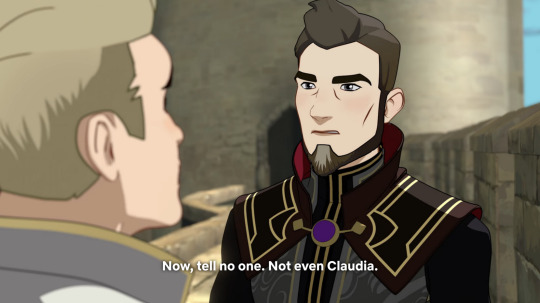
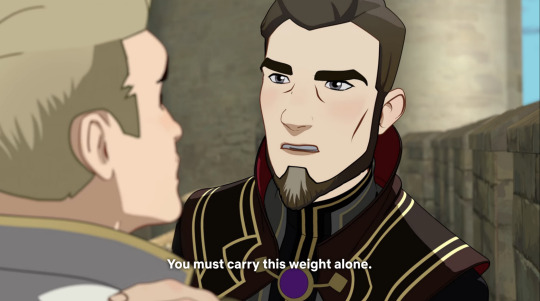
he never wants his friends to feel that way again
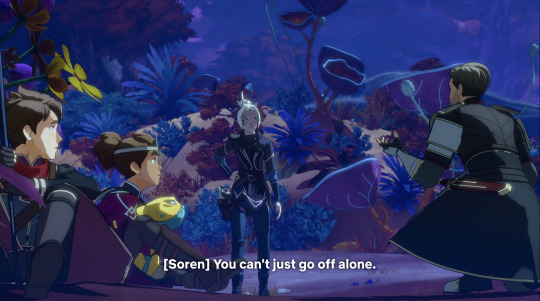
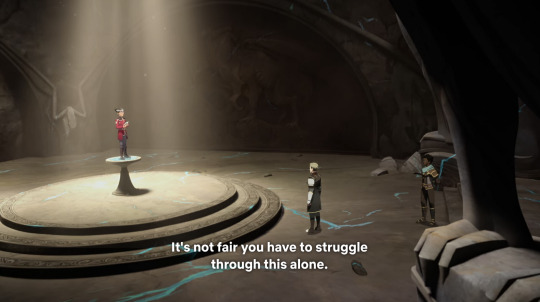
#the dragang#minus callum sorry callum#if soren gives him a 'you're not alone' later moment it shall be added#tdp soren#parallels#soren#theme: isolation#subset: stronger together#tdp#the dragon prince#1x06#4x05#5x02#even the way he looks after zubeia
210 notes
·
View notes
Note
What are your thoughts or analyses on the phallic imagery in berserk? Less so the more obvious ones like seen in Casca’s nightmares which are obviously pointing to her sexual trauma, but like we see with the vagina-esque monsters and how Guts’ sword is alluded to being like a penis in some cases. Sorry if it’s a weird question lol
Sorry for the wait on this lol, I was on vacation for a while, and it's also a topic I wanted to spend some time on because I love it and I wanted to be relatively thorough. Thanks for the ask!
So yeah, disclaimers out of the way, Freudian analytical theory is very silly, very gender essentialist in ways that can often be transphobic and misogynist, and as far as I'm aware pretty much wholly unrelated to real psychology. Back in the 70s and 80s you had film theorists who took it seriously as a genuine glimpse into the subconsciousness of humanity or whatever, but now it's pretty much just a readily available source of sex and gender related symbolism that's easy to understand.
And in Berserk I do genuinely think it's a valid lens to view the story through because Miura is often quite heavy handed in utilizing it as symbolism. I mean, Guts literally gives someone an orgasm by stabbing her at one point. Some of this can definitely be a stretch, taking established symbols and running with them, but some of it is also almost certainly purposeful. I'll leave it to you to decide what you see as legit and what you see as stretching believability here.
This is very long lol
So yeah, it starts off strong in Berserk with Guts' oversized sword. Swords are dicks, ie sources of masculine power, especially in Berserk

and in the context of the story the dragonslayer is Guts overcompensating imo. And it's not compensating for a small dick lol, which would be more the purview of comedy, but for a loss of masculinity, ie Guts' childhood abuse from Gambino, and rape trauma. It's about his need to prove himself because he was made to feel like he had to, imo.

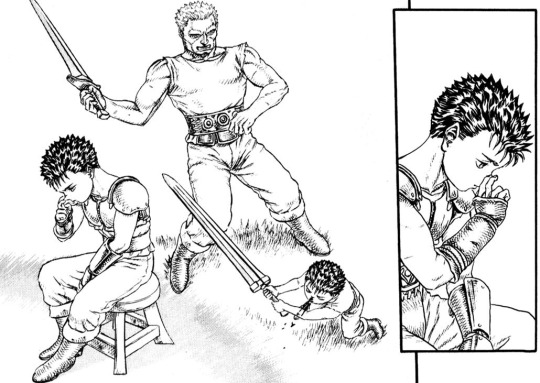
And it's not just the size of his sword, his obsession with it is also a major factor. He has a grandiose speech about how his sword is like a part of his body (hmm) and that it's been at his side through everything and he's always relied on it. The dream he lands on is to be the best and strongest sword fighter ever. He's currently having a breakdown over not being able to hit someone with his sword. He has a recurring tendency to break other guy's swords lol. At one point Casca screams at him that he essentially cares about his sword more than her. etc etc.
In the story dreams are at odds with emotionally healing human relationships, and dreams are represented by swords (Guts' sword obviously, Casca becoming Griffith's sword, Griffith calling the throne a sword while taunting the king in the dungeon as well as his vision of himself throwing him a sword and pointing to the castle in chapter 72).
So through a Freudian lens, Guts' sword can also be said to represent emotional isolation, positioning masculinity as emotionally isolating. Which, yk, fits with Griffith also equating dreams and masculinity in his Promrose Hall speech (a man must achieve a dream before he can have a family or lover) and, I suppose lol, Casca getting "softer" and more feminine as she falls for Guts, as femininity is therefore the opposite: emotional reliance on and support of others.
So if swords are dicks, then it follows that wounds are vaginas, ie yonic symbols. Also pretty obvious when you read some of the lines during the Guts and Casca sex scene lol. "I too want a wound I can say you gave me." These can represent weakness and victimization (I did warn for misogyny lol) and/or (often sexual) relationships and emotional openness.
So you have the relationships - "licking wounds" with Casca; Guts letting Casca stab him when he thinks about abandoning Griffith; the Beast of Darkness calling Casca the wound Griffith left so Guts can keep feeling the pain Griffith caused; Griffith scratching his own shoulder where Guts' sword pointedly didn't wound him; Griffith being out of reach of Guts' sword post-Eclipse; "let's give him a heap of raw iron;" and Farnese grinding on Guts' sword while possessed and Slan directly treating being stabbed as sexual penetration for the most obvious examples...
Also I'd argue that any time Guts gets his ass kicked in a fight it functions as an echo of his rape trauma symbolically and subconsciously to Guts. Both kinda obviously at times, like eg when Slan overpowers him and tears off his shirt while wounding his chest, and kisses him after the stabbing, causing Guts to feel a burst of fear

or when Rosine stabs Guts through the mouth as another enemy who flirts with Guts mid-fight. And of course the first duel with Griffith in which Guts unilaterally sets the stakes to sex slavery because he's projecting.
But also a little more subtlely, such as when Zodd is given the same position as Nightmare Donovan in Guts' concussion nightmare after he kills Adonis, or all this consistent imagery that rapists and apostles tend to get.
Or, interestingly, the way the Berserk armour functions as self-harm as Guts fights by penetrating Guts to "heal" him.

Something that solidifies its hold over Guts and makes him lose more and more of his positive humanity to his urge to kill.
So yeah, from a Freudian angle I'd suggest that Guts is driven to fight to reclaim the sense of masculine power he was stripped of when he was raped, and every fight can be said to be a repetition of his rape trauma in which he (usually) successfully fights back, but also continuously retraumatizes himself rather than healing.

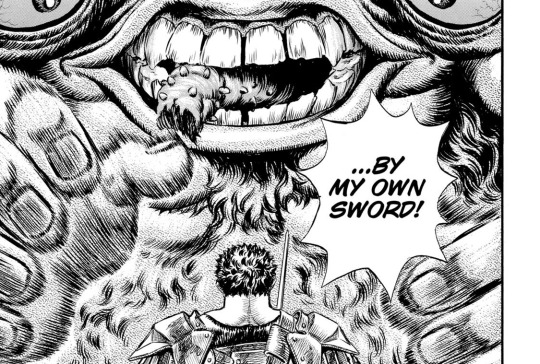
I'm going to delve a little deeper into how phallic and yonic symbols intersect with the characters' relationships now that we've outlined some of the preliminary symbolism, starting from the Golden Age.
The first duel between Guts and Griffith is rife with Freudian symbolism, very overtly. Griffith stabs Guts and then Guts proceeds to have a nightmare about his rape trauma. Then he projects that trauma onto Griffith when he assumes Griffith wants to fuck him and adds sexual stakes to their duel. Then, yk, he takes Griffith's sword into his mouth lol.

Griffith winning by dislocating Guts' arm can be easily taken as a symbolic unmanning/castration, nicely introducing us into Guts' three years of growth towards prioritizing relationships instead of aimless sword-swinging to prove himself. It's also suggestive of penetration when you're primed to look for sexual symbolism (and if Guts offering Griffith his ass and then biting a sword doesn't prime you for it, what does?):

And the two of them losing their swords in the course of the fight and resorting to unarmed combat can also be taken as a telling symbol of the conflict between dreams and their relationship with each other. They lose the symbols of their dreams and contend only with each other, in a more positive contrast to the second duel that ends their relationship, in which they fight only with swords and never touch each other.
Wounds come into it when Griffith nearly gets killed rushing in against Zodd to save Guts, leading to the most impactful moment of their relationship, where Griffith admits he did it solely for Guts' sake and had no other reason. Griffith also points out how wounded Guts is after that fight, in what I'd call a nearly flirtatious way:

And if you follow these symbols completely strictly this scene suggests Guts retreating into his defensive masculinity in his sword exercises after being defeated/emasculated by Zodd and accused of not valuing his personal relationships by Casca, and finally finding a new, more constructive purpose for his sword after Griffith essentially confesses his devotion to him.

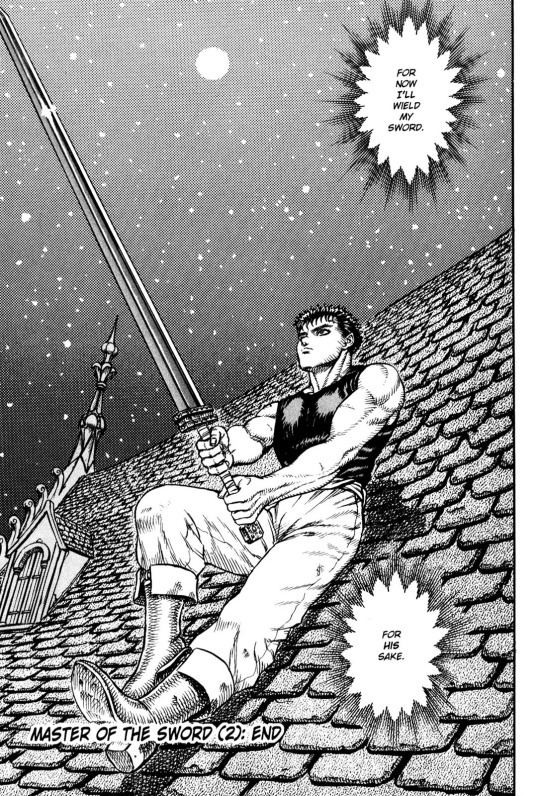
Dedicating his sword to Griffith in return for the wounds Griffith suffered for his sake, with, it has to be noted when the topic is freudian symbolism, his sword held at exactly crotch level.
In the second duel Guts destroys Griffith's sword before leaving, a symbolic castration which is most likely intended to represent and foreshadow Griffith's subsequent loss of power when he throws his life away and ends up tortured in a dungeon for a year. More interestingly imo, is Griffith tracing scratch-markes on his shoulder after sleeping with Charlotte and while crying over Guts - the same shoulder Guts' sword didn't quite hit when he won the duel, drawing attention to the lack of a wound by Guts' hand, a wound he created himself and traces in his devastation.
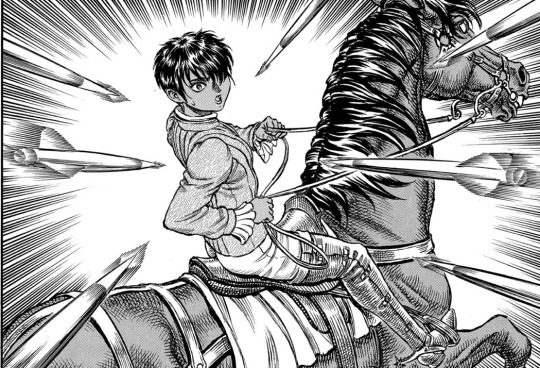
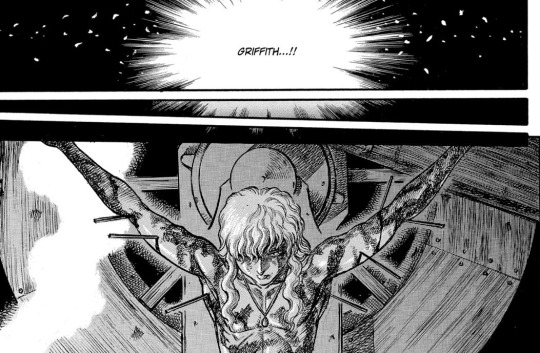
You have a nice... I don't know what the comic terminology is lol so I'm just going to call it a match-cut here, with Griffith and Casca both getting penetrated by the same number of arrows/skewers, to signify Griffith and the Hawks' fall from power, in contrast to Guts' growing phallic power as he pursues his sword swinging. Power which he demonstrates when he returns and saves the Hawks and Casca and Griffith by swinging his sword a lot and defeating a lot of powerful enemies and, if I'm gonna be crass, healing Casca's suicidal despair with his dick lol.
Interestingly though, before he does that he lets Casca stab him while experiencing the guilt of having driven Griffith into a torture chamber by leaving. It's a wound that highlights his emotional connection to Griffith and vulnerability to those emotions, even as he tries to deny them. He then manages to successfully deny them for a little while longer after having sex with Casca.
In this Freudian context, Guts and Casca's sex scene is an affirmation of a relationship, but one which is emotionally uneven, with Casca ready and willing to emotionally rely on and support Guts, but Guts still dedicated to his sword-swinging dream, inviting Casca with him but only as long as she doesn't get in the way of what he wants to do. This does fit with phallic symbols being associated with emotional distance and yonic symbols being associated with emotional closeness lol. (Also fittingly, the one way he does open up to her is about his rape trauma after a flashback.)
It's worth noting that in this disconnect Casca erroneously assumes Guts fought the hundred men and "bled" for her, making her want "a wound" from him in return. Guts fighting those hundred men is much more reminiscent of his fights against apostles, the fights that revolve around replaying his rape trauma to make himself feel better. Casca assumes they already have an emotional bond due to Guts' wounds, but she's wrong - Guts specifically thinks to himself during the hundred man fight that he's not doing it for Casca.
This is reflected in the Wyald fight when Guts insists on fighting Wyald, again as part of the whole reaffirmation of masculinity thing I outlined at the start of this, when Casca just wants him to run away. The Wyald fight is pretty overt about being about Guts' rape trauma imo, moreso than most fights in the story. Wyald's rapiness is made a point of from Guts' point of view when he sees him wielding the torso of a woman sexually impaled on a pike and gets extra angry, and when he literally cuts off Wyald's dick when he's about to rape Casca, and then has his pointed line about needing to "settle the score with him... with them... by his own sword."
SO ESSENTIALLY to sum up this subsection, I think you can argue that what prevents Guts and Casca from being an equal relationship is Guts stlil being hung up over needing to prove his masculine power through sword-swinging, rather than embracing his emasculation (which, remember, tends to signify positive relationships in this context) and coming to terms with it ("immersing himself in sorrow" as Godo says much later.)
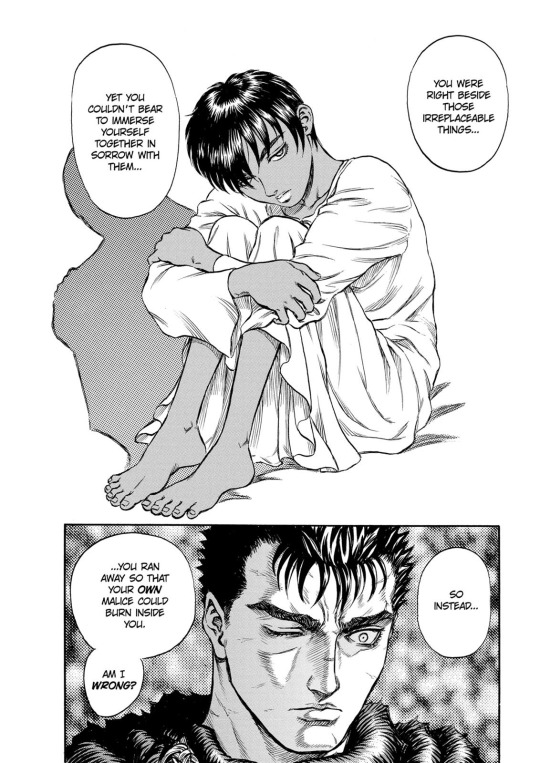
Like, to return to Griffith, it's fitting that after Guts destroys his sword and he goes through a year of torture and is thoroughly emasculated, he's able to recognize his feelings for Guts and understand that Guts is more important to him than the dream, the "sword called the throne."
But he doesn't quite come to terms with his emasculation either. This symbolism is one explanation for the wagon scene where he propositions Casca - a desperate bid for some form of power. Not the strongest explanation imo, but since we're currently in the business of actively looking for this symbolism, it definitely fits. Casca's rejection and pity reinforce Griffith's emasculation, and overhearing her tell Guts to leave again is the final straw. Relationships are a bust, swords are now his only recourse, as we see when he has a vision of himself throwing him a sword and pointing to the castle.

You could take the nightmarish vision he has of a life with Casca as Griffith rejecting emasculation, but an alternate way of taking it is Griffith regaining a form of phallic power, and the emotional isolation that goes with it. After all, it's implied that he has a child with Casca, while totally withdrawn and emotionally isolated.
I once said in a different silly essay that Griffith choosing the dream is, in a way, Griffith choosing another version that nightmare, and that take also fits here.
And hey, it's another reason for Femto to rape Casca lol, if we want to ascribe meaning there, and of course we must in this kind of analysis. In the wagon Griffith essentially offers sex to Casca for the faint vestige of masculine power it could give him (emotional isolation and a child); in his nightmare he imagines that life and it drives him to suicide; and after becoming Femto he forces sex onto Casca and then continues on to embody emotional distance and masculine power.
This power is painfully demonstrated through the rape of Casca, but also subsequently through his pure untouchability (often in pointedly sexualized contexts); through his phony relationship with Charlotte and ascending to the ultimate patriarchal role of king/emperor and taking that sword called the throne; and I guess also through his actual sword lol which he still uses.
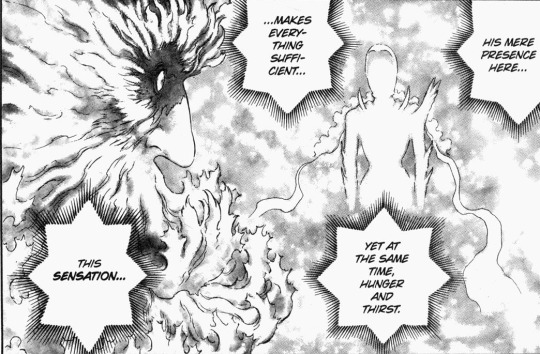
An example of sexualized untouchability - check out the positioning of that third thought bubble, in this scene where Griffith lords his invulnerability over Ganishka.
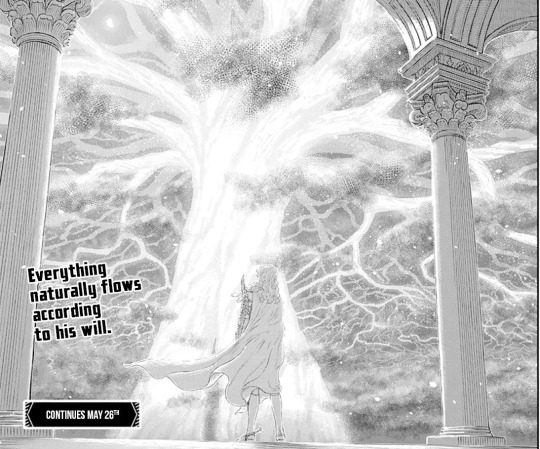
And look at all those pillars, I'm js.
And I'd be remiss not to point out the most recent confrontation with Guts where Guts tries many times to hit his naked body with his giant sword, completely fails, and then Griffith kidnaps Casca. More very on-point emasculation symbolism, it might as well be Guts trying to fuck him but unable to get hard lol. His breakdown afterwards doesn't do much to disabuse you of that notion either.
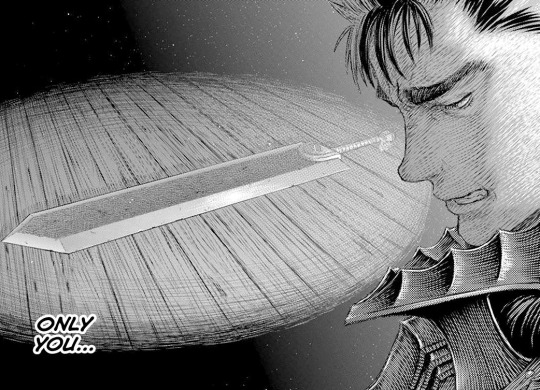
Anyway, back to post-Eclipse Guts. There's not much else to add that I didn't cover at the start, but in brief:
Guts has lost his arm during the Eclipse, which is an emasculation - he loses it while watching Femto rape ~his woman~ so it's like the most traditional symbolic castration there is lol. And of course he replaces it with a bigger, better, and more overt phallic symbol: a canon. And like the first thing we see him do with it is shove it into the mouth of a monster he's banging and blow her head off. So yk, there's that.
And there's Puck, who exists to help bridge Guts' emotional distance and essentially serves as the feminine counterpart to Guts' masculinity for a while. From his magical empathy, to his tiny size, to his lack of genitalia (note that in Freudian theory the lack of a penis is an indicator of femininity rather than specifically the presence of a vagina), to his connections with female characters Theresia and Jill, even arguably to his introduction where Guts saves him from a bunch of men throwing phallic knives at him by skewering them with his own (bigger) projectiles, this is consistent during the Black Swordsman/Conviction arc era.
Chestnut Puck is a lot more boyish, with his particular humour, his cameraderie with an annoying teenage boy, and now having his own feminine counterpart in Ivalera, but that's fine because his thematic job as a feminine influence on Guts is over after Guts starts collecting more friends.
And as far as the RPG group goes, there are a few notable instances of phallic symbolism for them too. Farnese and Serpico are an obvious example, with Farnese sexualizing the wounds Serpico voluntarily suffers for her, when she demands he duel for her honour a bunch of times.

Farnese brandishing the end of her whip at him doesn't hurt the freudian power dynamic symbolism either lol.
In the Conviction arc Farnese wielded a sword she was incapable of using, suggestive of her true femininity under a brash masculine surface, and when she softens in the Millenium Falcon arc she becomes a caretaker with only a small dagger for self-defense. That said, she does get that epic moment of stabbing a tiger in the eye with a long silver pole (candlestick) when she rejoins Guts' crew rather than becoming a housewife, so she still gets some badass phallic weapon imagery lol.
Serpico wields a thin rapier in the Conviction Arc, which Guts easily grabs in his hand, and in the Millenium Falcon arc he switches to a... limp feather duster lol. Serpico is very feminized compared to Guts and his weapons fit as part of that, but they're still effective weapons. You could maybe argue, within this Freudian lens, that this is indicative of Serpico's healthier relationship with masculinity. He's not compensating for anything, he's at peace with himself.
And god I gotta say something about Guts and Serpico's duels. In the first one you have Serpico delaying Guts while Farnese steals Casca from him, and part of that delay is to force Guts into a fight where he can't wield his sword, a parallel emasculation to Casca being kidnapped.
Then you have their confrontation after Farnese's no good very bad night, which is just incredibly suggestive lol.
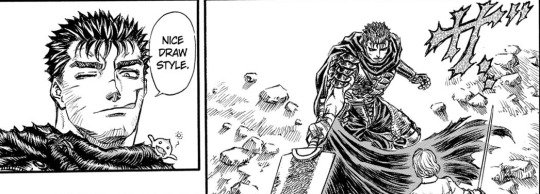

You cannot tell me this isn't Guts getting blueballed when Serpico leaves after one quick exchange. Particularly coming in the same chapter featuring possessed Farnese grinding on Guts' sword (which Guts was much less interested in, incidentally). Also: wounds as sexual imagery again. Guts licking the blood off his cheek? Come on.
And finally you have their fight in Farnese's basement, in which Serpico attempts to hinder Guts by surrounding him with giant pillars, which Guts smashes through as he dodges around them. Another neat illustration of Guts' pure phallic power and Serpico's much more effeminate style.
One final note to address part of your ask, which didn't naturally fit into the rest of this lol: I would interpret vaginal imagery in monsters as mainly castration anxiety, yk, vagina dentata vibes, the fear of sticking your dick in a hole you can't see into. There's actually a lot of interesting stuff to consider in terms of the feminine as the unknowable other when it comes to Freudian theory, but that's like, not something I would expect Miura to lean into first of all, and also it would take another essay of explanation. If you're interested in that kind of Freudian analysis though I'd recommend the books Men, Women, and Chainsaws by Carol J. Clover and The Dread of Difference, edited by Barry Keith Grant. I took a course on women and horror films ages ago and read chunks of those, and it was very fun, and iirc both address Freudian imagery in horror.
Okay! So that's the rundown of like, all the examples of Freudian imagery that interest me at least lol. This isn't exhaustive ofc, Berserk is long and not stingy with this stuff, but this response is already so long and meandering lol, so I'm going to wrap it up here.
To sum up, phallic imagery often represents masculine power as well as masculine flaws (like emotional isolation) in Berserk, while yonic/vaginal imagery tends to represent feminine weakness as well as feminine virtues (like emotional connection and vulnerability). As a general rule, the more phallic imagery someone violently swings around, the more fucked up they are. Phallic violence is used to compensate for past trauma, but it only continues the cycle of violence. The way to break that violence is to accept one's wounds and focus on them, to heal, rather than trying to distract from them.
I don't think this is always the best way to interpret Berserk lol, but it adds another dimension that very often complements the surface meaning and thematic resonance of the story, sometimes purposefully, sometimes likely incidental. And either way it's a lot of fun to read into!
#genuinely thank you for asking lmao this was so much fun to write#sorry it took forever though i had a lot of shit going on the last couple months plus a bunch of other asks that didn't require#as much effort lol so i only worked on this intermittently#ask#anonymous#a#b#theme: symbolism#theme: revenge#theme: relationships as personal growth#theme: isolation#theme: trauma#character: guts#character: griffith#arc: ga#arc: mf#arc: bs#(just a note: i've used image descriptions on a few of these images but not all. that's deliberate - i've described the ones that aren't#naturally described by what i've written in the post itself. generally i try to word my posts so image descriptions are unnecessary but#there are a few here that would be clunky without descriptioins)
76 notes
·
View notes
Text
Thinking about Never Grow Up kind of being the closing statement of Speak Now. Feeling very ill.
2 notes
·
View notes
Text
i love the extras of dungeon meshi in how it fleshes out the world because they make it so much more evident how race affects every part of the story while avoiding the zootopia racism problem. like obv a main theme of the story is like, humanity and desire, 'to eat is to live', etc, but since the majority of it takes place in the dungeon isolated from society and thru the lens of laios, the racial aspects play out more like shadows on a wall for most of the story.
then in the extras we get comics like this

which at a glance fleshes out the racial aspects via a character explaining the racial rules of universe - humans have x amount of bones, while orcs and kobolds have more. however, if u take it less straightforwardly, it points out how the concept of 'human' is a constructed concept in the world. the fact that there are different categories of human in different parts of the world based off of what types of humanoids occur there is already a demonstration of this. in response, the bones explanation seems to kabru and the characters as an objective way of measuring humans vs nonhumans.
but obv, when the culture was deciding what humanoids were humans and nonhumans, they weren't blindly analyzing skeletons and then deciding. just visually, one can glean that orcs and kobolds look less like the ingroup of tallmen, elves, dwarves, gnomes, etc. the bones explanation appears as a justification for that immediate prejudice under a scientific guise - I'm sure that one could come up with the same number of physical differences between a gnome and an elf that they would find between a tallman and an orc. it sounds a lot better to say 'well, an orc has 230 bones while a human has 206' then 'well, an orc looks ewwww yucky yucky to me while a human looks normal'.
and what i like abt the comic is that the characters take the explanation at face value for the most part. when a contradiction is brought up in the oni, kabru can neatly slot them into the predetermined number of bones framework. bc that's kinda how it works irl - there r cultural prejudices that we can posthumously justify, and if we find something outside of it, we can twist it to fit into our predetermined binary. however, since the reader does not live in a world where there are orcs and kobolds to be prejudiced against, we can see that flaw in the cultural logic. when the party encounters the orcs, the number of bones has no bearing on their humanity. They r shown to be cliquish and distrusting of outsiders, but not any more than the elves are later in the story.
tldr dungeon meshi worldbuilding is so good
#just me#dungeon meshi#kabru#there r 10000000 examples of how fantasy racism affects the story of dungeon meshi not brought up in the main story#like namaris backstory and chilchucks union and the oni#augh. tasty manga#girls when themes of social isolation#ppl talk Abt the neurodivergent rep/allegory#the racial allegories aren't half bad either#social isolation guys social isolation
6K notes
·
View notes
Text
flag description template from under the cut for archival reasons:
description template: a gender under the genderrecluse system related to [x] and recluses, or being (a/n) [x] and a recluse; a gender related to [x] (or [x] aesthetics) (and) recluses; a gender related to [x] as well as isolating oneself or avoiding others.
the idol sings you a song...





★ genderrecluse
[pt: genderrecluse /end pt]
a gender system related to recluses, or being a recluse. it is also related to isolating oneself, and avoidance. this gender isnt meant to be romanticizing isolation, and is self indulgent— i.e. made by a recluse.
meant for neurodivergent people, but anyone can use. term description template + example below the cut ^_^
coined by us!
see also: recluse
we do not consent to our creations being added to any wikipedia sites or reposted to other social media sites. anyone may use our terms and flags.
; tagging . . @radiomogai; @noxwithoutstars; @daybreakthing; @flutteringwings-coining; @rwuffles; @scr-ppup; @smilepilled; @floraeth; @the-astropaws; @somniabyte

description template: a gender under the genderrecluse system related to [x] and recluses, or being (a/n) [x] and a recluse; a gender related to [x] (or [x] aesthetics) (and) recluses; a gender related to [x] as well as isolating oneself or avoiding others.
example of a description: a gender under the genderrecluse system related to cats and recluses, or being a cat and a recluse; a gender related to cat recluses; a gender related to cats, as well as isolating oneself or avoiding others.
#gender system#gender systens#genderrecluse system#genderrecluse#theme: neurodivirgency#theme: isolation#skipping queue
50 notes
·
View notes
Text
youtube
#isao takahata#studio ghibli#only yesterday#heidi: girl of the alps#grave of the fireflies#favourites#background noise#quality culture#media#art#pom poko#theme: transience#theme: isolation#theme: community#theme: nature#theme: imperialism#theme: urbanisation#theme: nationalism#theme: war#my neighbours the yamadas#theme: life#theme: death#theme: impermanence
1 note
·
View note
Text
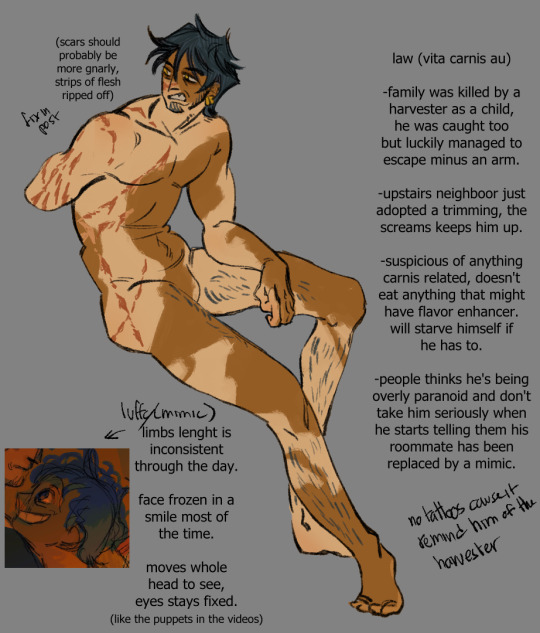

carnis au or also 'one meat', have some lore!
#trafalgar law#monkey d luffy#my art#my comic#op carnis au#described in alt text#totally forgot i drew that like. last week or smth. the idea is exploring themes of paranoia and perceived paranoia. conspiracy and also#surviving the fuck up thing that live inside your hourse and all your friends insist is the same guy as always. it's also law investigating#what happened to luffy and who he was since he never befriended him or anything. the mimic is creep af but doesn't seems to want to kill#law. rather it tells him it'd be sad without him which scares law even more. this luffy was very isolated. he moved after ace's death. no#family. his friends in another region/country? he was all alone and easy to replace without anyone noticing.#unrelated but doflamingo 100% is a mimic btw. it just fits. not all that relevant tho cause i want this au to be very centered on law n luf
405 notes
·
View notes
Text

"Her mind is engaged in a rapt contemplation Of the thought, of the thought, of the thought of her name: Her ineffable effable Effanineffable Deep and inscrutable singular name."
My piece for the free Curse of Strahd zine, Memento Mori, depicting Stella Wachter! Do not hesitate to check out the zine over at @mementomoristrahdzine for more wonderful CoS art, you will not regret it!
#curse of strahd#traditional art#stella wachter#dungeons and dragons#dnd#my art#new post ! new post !! literally all i've been doing lately has been zine art#i'm really happy to be able to post this one#i'm pretty happy with how it turned out !#stella is such a tragic character and dms could and should do so much more with her#the themes of madness and isolation and entrapment and familial denial... come on.....
1K notes
·
View notes
Note
Apologies for the (mini) rant OP but I have #thoughts...
it's sort of written in this transitional phase between attachment and detachment from her partner, and from the life formed with him. we know that from it being written during the midnights bulk months. it comes at this point where she's questioning everything about her life up until this point AND her life moving forward. so much of midnights is as reflective as it is predictive. it's an album filled with analysis of patterns in her life - whether that be in her own behavior, or that of the people around her, OR in the people she chooses to surround herself with.
with that in mind, the song, much like so many others on the album, is sort of written in the past, and the future, and the present. we know the feelings of false idol-hood don't begin and end on midnights (ttpd is sort of... entirely about that, lmao), nor do the feelings of emotional isolation, even when that isolation is not physical (her comments on the 1989 era during miss americana, high infidelity, literally everything she's ever said about CH post dating him).
So like... it feels present because it IS, and it feels distant because it IS.
It's actually wild to me that she released Dear Reader. That was a song that I was convinced was from a midnight a while ago. Listening to it post ttpd is...ouchie
dear reader always confused me, i think because we all assumed it was from the past, but the lyrics and placement on the album feel SO present. also, considering how deeply it matches the midnights prologue, it's so funny that she made it a bonus track lmfao
#i have a lot of thoughts for this album considering i don't particularly care for it#oh well#ts#theme: isolation#theme: reflection#🕰#🎧#🍸
36 notes
·
View notes
Text

always on the hunt
#ok what if nepeta was expanded as a character huh what iffff#because the theme of isolation is everpresent in the story#and she is another example of it#among other things#she's everything but selfish she mightve been reduced to being a shipper but she cares so much#she can read people and potentially make them understand eachother and themselves#but she doesnt think about her happiness she only dreama about it#understanding romance couldve been so important if you could parallel their session with the story of their ancestors#but the leijons always seemed written to be doomed#homestuck#fanart#my art tag#nepeta leijon#HEART PLAYERS ARE COOL
266 notes
·
View notes
Text
Do you ever go insane thinking about how every member of Laios' party is extremely atypical for their species, but a lack of exposure and understanding smoothes out these differences and makes everyone think they're the "typical" representation.
Senshi is terrible with other dwarves since he has no practical interest in mining or weapons craft. We cannot know this until Namari and later, Senshi's backstory are introduced. When we see him interact with dwarves, it's awkward and clear there's a fundamental disconnect.
Chilchuck is incredibly tall for a half foot and as such has to manage his weight more than other half foot dungeoneers so he doesnt set off traps. The first detail takes the changlings to properly understand, the second is referenced in text but is fully explained in additional materials. It is plot relevant that people who don't have the exposure to half foots might not even realize they're their own species.
Marcille as a half elf is kind of obvious to many of the elves who encounter her and they're deeply cruel and assume she's driven by a desire to be able to have children but the party never notices and Senshi especially thinks of her as a typical elf even though in truth she's so outcast she could never dine with her mother at the queens table.
Laios and Falin are a bit more complicated, since we as the audience do have context for most of tallman culture, since it mirrors our own mostly, but both of them have magical aptitude that both people like Marcille, who has a lot of access to mana and people like Chilchuck, who has very little and no magical training, fail to understand how isolating it is to have that much potential and aptitude.
Arguably Toshiro and Namari fall into this as well. Toshiro looks like the embodiment of the silent but noble warrior, but his own party and extra material confirm that he's abnormally shy and introverted, something that makes it hard for him even in his own family. Meanwhile Namari is able to stand on her own as a weapons expert and "typical" dwarf, but total dwarves who are total strangers like Dya know who she is and resent her.
Arguably a lot of dungeon meshi is about peeling back layers and assumptions not working out, but it's so great that every member of the core party gets interpreted by others (and maybe the reader) as "typical", especially with the skills line up, as a human fighter, halfling rogue, and an elven mage are so basic a stereotype. But none of are able to achieve that standard. These assumptions and misunderstandings only thrive because each party member is so inexperienced with both the biology and culture of the others. The only way they gain context is either interacting with a wider pool of people or experiencing it for themself. Everything in this story is so layered and I love it.
#i feel a little silly for typing this all up. maybe ill delete it later#anyway all of the party seems like the stereotype but actually all of them are isolated from their own people. chewing glass#i realize this is an incredibly basic theme of the story but. i find it neat.#dungeon meshi spoilers#dungeon meshi manga spoilers#dungeon meshi#laios touden#marcille donato#chilchuck tims#senshi of izganda
416 notes
·
View notes
Text
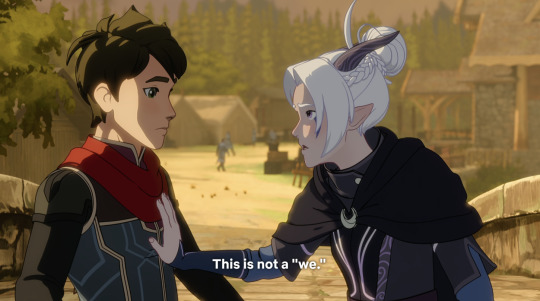

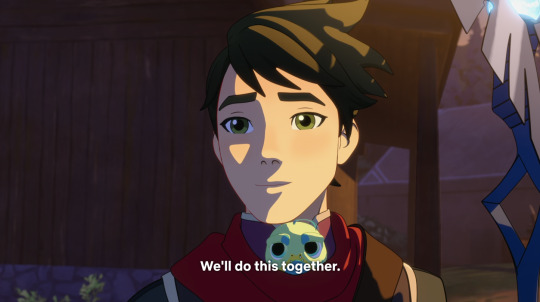
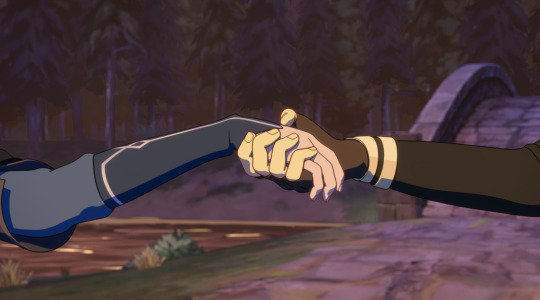
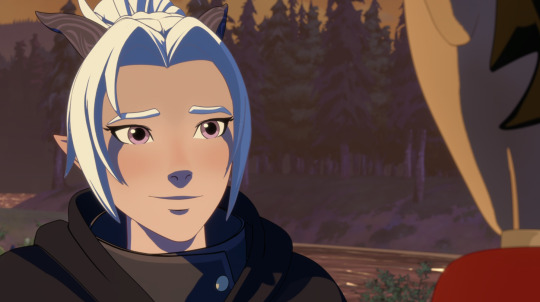
Together
#rayllum#the dragon prince#theme: isolation vs togetherness#7x02#s7 spoilers#s7#arc 2#tdp spoilers#mine
148 notes
·
View notes
Note
What are your favourite Berserk symbols?
I'm assuming you mean like, usages of symbolism as a narrative device rather than symbols within canon like the brand of sacrifice or the hawk emblem.
In which case I gotta say I really like the thorns as a symbol of trauma, or like, more specifically the self-destructive lashing out people do when they're traumatized.
Also I can't deny that I enjoy the freudian symbolism too. Swords are dicks and sometimes that makes Berserk extra fun.
The Hawk mask as a concrete symbol for self-imposed isolation and emotional distance is excellent imo. That can also be generalized to dreams as a symbol for emotional distance, but I like the helmet as a visual. The helmet as his signature look as leader of the Hawks, trying to distance himself from his friends because they have a tendency to die for him; then locked onto him during his torture after Guts abandons him because of that distance and he finds himself truly all alone; and then physically part of him as Femto after he's sacrificed everyone he cares about and removed (or tried to remove) all emotional connections he had left; and then a part of NeoGriffith's main outfit almost as if coming full circle.
Maybe a sign that he's choosing to distance himself again but there is a choice now? Or maybe it is still metaphysically part of him. Either way I'm into it as a look that shows how removed he is from others while tying the metaphysical nature of that removal now to his deliberate choice to distance himself as the human leader of the Hawks.
So yeah, let's go with those three. Really there are a ton of symbols in Berserk I could throw out there and they're all great, but those leapt to mind first and I'm very into them.
Thanks for the ask!
#ask#anonymous#a#b#theme: symbolism#theme: opinion#theme: isolation#i was also considering the way swords symbolize dreams but I feel like what I love about that is how it all ties together with adverse#reactions to trauma (man picks up the sword to shield the small wound in his heart) and that's less about loving a piece of symbolism#and more about loving the thematic core of berserk lol
18 notes
·
View notes
Text

LONG COURTNEY

The Girl Who Painted Death, MYTH: Side One

WHOEVER FELT MOVED TO SPEAK, MYTH: Side Two
#the narcissist cookbook#myth side one#myth side two#themes. storytelling as compulsion. isolation and the fragile necessity of connection. and terror.#for context to my followers the first screenshot is from a song talking about conspiracies surrounding kurt cobain’s death
64 notes
·
View notes
Text
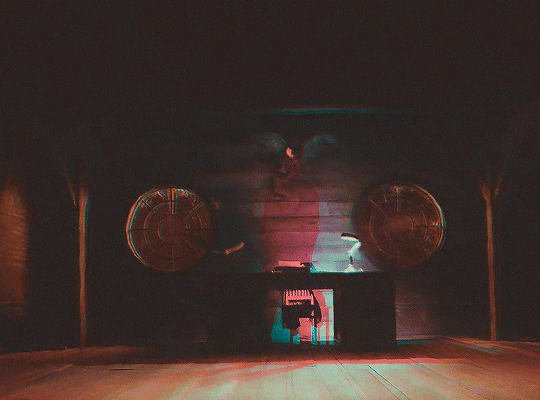
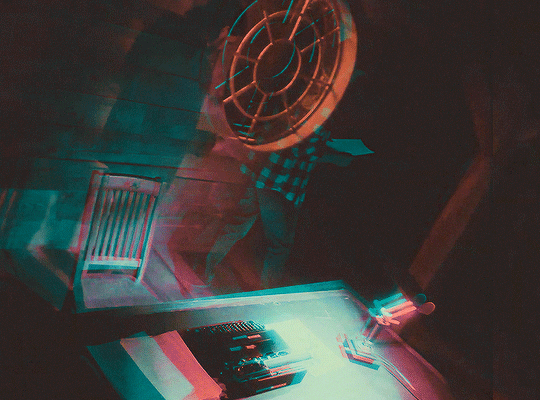
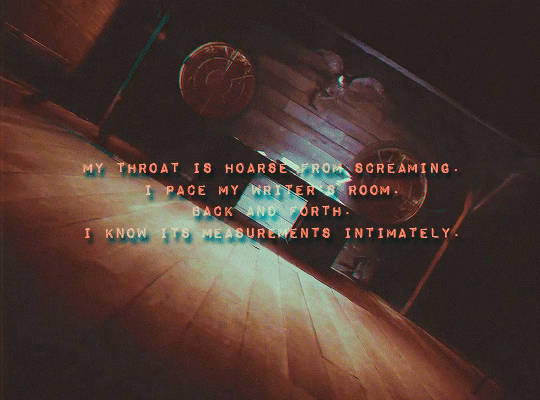
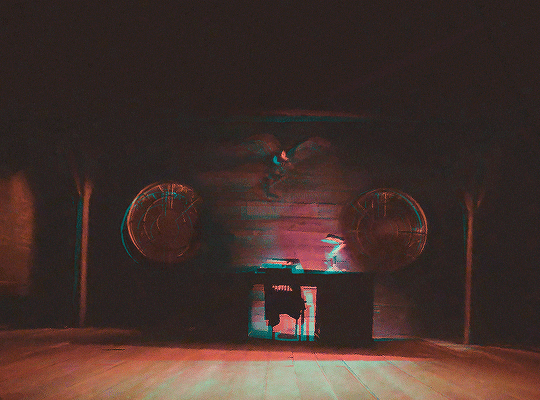
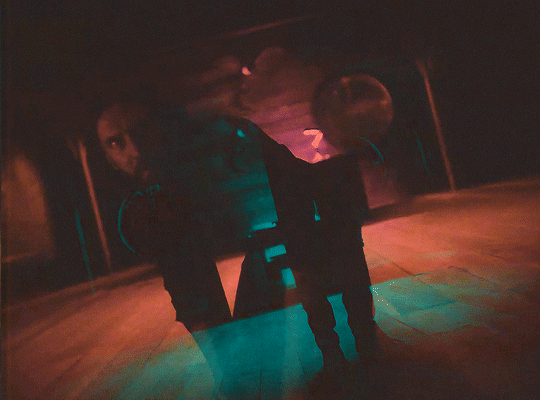
#alan wake#alan wake 2#ilkka villi#awedit#alanwakeedit#mk.op#mk.edit#mk.gifs#that line from dbd lives rent free in my head#just like the 'what color are her eyes' line#also what does it say about me that all my favs#seem to have a theme of entrapment/isolation
188 notes
·
View notes
Text
Ok actually re: Dark in Here discussion, it genuinely is such an incredible album, and it speaks so exactly to that early 2020 feeling. The absolute isolation and loneliness of it all is so profound that I can never quite believe that it was written and recorded before lockdown started. And it's so musically interesting, too - it goes places that I don't think much, if any, other tMG work does! The breakdown at the end of Lizard Suit is one of my favorite things ever, but you also have songs like Slow Parts and To the Headless Horsemen that are so even and measured that it's almost eerie. It's such a great album that really really does not get enough love!
#txt#transmissions from lyric#the mountain goats#tmg#dark in here#genuinely love this album so so much and nobody talks about it....i could write an ESSAY on the themes of isolation#seriously its so insane that it was recorded the first week of march 2020 bc it feels so intensely like something that came out of lockdown#ESPECIALLY lizard suit and to the headless horsemen. again. i could write a wholeass essay#we were talking about this yesterday w the daily goat in the discord being lizard suit so its just really on my mind
40 notes
·
View notes